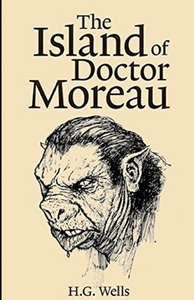Take a photo of a barcode or cover
2nd reading - first one was when I was a teenager and it was even better this time round.
Loved it. The text is very poetic but the story unfolds brilliantly with mystery and evocative imagery.
Still a classic for all of the best reasons.
Loved it. The text is very poetic but the story unfolds brilliantly with mystery and evocative imagery.
Still a classic for all of the best reasons.
challenging
dark
tense
medium-paced
Plot or Character Driven:
Plot
Strong character development:
No
Loveable characters:
No
Diverse cast of characters:
No
Flaws of characters a main focus:
Yes
For a book that’s 125 years old, it raises questions about scientific ethics, religion, colonialism, and civilization that are salient in the present. I was expecting an old-time mad scientist adventure tale, so I was pleasantly surprised. Wells’ writing style hasn’t aged well, so at times it was a slog.
A fascinating look into what humanity can do, but a question of even if you can, should you?
It really does go through how different people can justify their actions and the real danger when the aim is seen as bigger than rights of others.
Wells really was ahead of his time
It really does go through how different people can justify their actions and the real danger when the aim is seen as bigger than rights of others.
Wells really was ahead of his time
dark
mysterious
tense
medium-paced
Plot or Character Driven:
A mix
Strong character development:
No
Loveable characters:
No
Diverse cast of characters:
No
Flaws of characters a main focus:
Yes
adventurous
challenging
dark
mysterious
reflective
tense
medium-paced
Plot or Character Driven:
Plot
Strong character development:
No
Loveable characters:
No
Diverse cast of characters:
Complicated
Flaws of characters a main focus:
No
Written in 1896, The Island of Dr. Moreau is an early science fiction treatment of what makes a human and the ethics of biological experimentation on sentient creatures. I found it it be sad and disturbing.
Our protagonist, Englishman Edward Prendick, is saved by a passing ship after the ship he's on wrecks in the south Pacific. The ship that saves him is unfortunately full of animals on its way to the infamous island. The man who saves Prendick, the doctor's assistant Montgomery, mentions that the labs of a Dr. Moreau are on the island and Prendick recalls the name as Moreau worked as a physiologist in London until his horrifying biological experiments were made public which caused him to flee from England to parts unknown. Prendick is taken care of on the island but is kept in a hut away from the labs.
While on the island Prendick eventually encounters Moreau's ghastly creations, some of which exhibit a subhuman intelligence, and hears the screams of the animals being experimented on. He eventually discovers exactly what horrors are taking place and confronts Montgomery and Moreau, and the plot picks up steam from that point on. Things do not go well for any of the characters, human and proto-human.
I listened to this on Chirp and Gordon Griffin did a fantastic job telling this chilling tale. This story is typical HG Wells - cutting edge science fiction for his time. While the subject matter was dark and more bizarre than what I'm used to for HG Wells I still really liked this despite the dreadful imagery it planted in my mind.
Our protagonist, Englishman Edward Prendick, is saved by a passing ship after the ship he's on wrecks in the south Pacific. The ship that saves him is unfortunately full of animals on its way to the infamous island. The man who saves Prendick, the doctor's assistant Montgomery, mentions that the labs of a Dr. Moreau are on the island and Prendick recalls the name as Moreau worked as a physiologist in London until his horrifying biological experiments were made public which caused him to flee from England to parts unknown. Prendick is taken care of on the island but is kept in a hut away from the labs.
While on the island Prendick eventually encounters Moreau's ghastly creations, some of which exhibit a subhuman intelligence, and hears the screams of the animals being experimented on. He eventually discovers exactly what horrors are taking place and confronts Montgomery and Moreau, and the plot picks up steam from that point on. Things do not go well for any of the characters, human and proto-human.
I listened to this on Chirp and Gordon Griffin did a fantastic job telling this chilling tale. This story is typical HG Wells - cutting edge science fiction for his time. While the subject matter was dark and more bizarre than what I'm used to for HG Wells I still really liked this despite the dreadful imagery it planted in my mind.
The Island of Doctor Moreau is a work of science fiction in the Edwardian style where a serious man of science experiences something fantastical and relays it to the reader in a straight-faced, rather dour, manner so that you can be assured, "dear reader", that he is a man worth listening to who would not ordinarily be taken to flights of fancy. The whole thing really exudes the stiff upper lip attitude of the British Expeditionary Force.
The book supposedly takes place somewhere in the South Pacific and has a plot line that I almost knew already from Simpsons parodies without really knowing where it came from. The basic idea is that our Serious Man(TM) has found himself on an island with a mysterious doctor conducting experiments that blur the lines between man and beast.
Three years the elder of Joseph Conrad's Heart of Darkness, The Island of Doctor Moreau feels thematically similar. The Serious Man(TM) is an outsider to the excesses that the remoteness of the colonies has allowed the men there to engage in. Similar to Heart of Darkness, or the Vietnam war films based on it, the deviants on the island are suspicious of an outsider as he's likely to be soft and innocent; he won't understand them or why they do the things they do. (He hasn't seen what they've seen, maaaaaaaan.) The island is more or less deserted except for our Serious Man(TM) and the conspirators conducting to the experiment which keeps the story clear of latent racism and/or the implication that it's "going native" that has made these men the way they are, which I was grateful for. The book is definitely operating on the same plane as Heart of Darkness, albeit more obliquely, portraying the extremities, the monstrosities, of colonialism that take place away from the civilising eye of society and asking, in an admittedly heavy-handed manner, who the real beasts are.
All told, the book is predictable enough, quite formulaic really. I feel the content of the book might have been shocking in its day, being graphic enough at times, but the book lacks suspense or real mystery. It's worth a read but it's nothing to rant and rave about.
The book supposedly takes place somewhere in the South Pacific and has a plot line that I almost knew already from Simpsons parodies without really knowing where it came from. The basic idea is that our Serious Man(TM) has found himself on an island with a mysterious doctor conducting experiments that blur the lines between man and beast.
Three years the elder of Joseph Conrad's Heart of Darkness, The Island of Doctor Moreau feels thematically similar. The Serious Man(TM) is an outsider to the excesses that the remoteness of the colonies has allowed the men there to engage in. Similar to Heart of Darkness, or the Vietnam war films based on it, the deviants on the island are suspicious of an outsider as he's likely to be soft and innocent; he won't understand them or why they do the things they do. (He hasn't seen what they've seen, maaaaaaaan.) The island is more or less deserted except for our Serious Man(TM) and the conspirators conducting to the experiment which keeps the story clear of latent racism and/or the implication that it's "going native" that has made these men the way they are, which I was grateful for. The book is definitely operating on the same plane as Heart of Darkness, albeit more obliquely, portraying the extremities, the monstrosities, of colonialism that take place away from the civilising eye of society and asking, in an admittedly heavy-handed manner, who the real beasts are.
All told, the book is predictable enough, quite formulaic really. I feel the content of the book might have been shocking in its day, being graphic enough at times, but the book lacks suspense or real mystery. It's worth a read but it's nothing to rant and rave about.
adventurous
dark
mysterious
reflective
fast-paced
Plot or Character Driven:
Plot
Flaws of characters a main focus:
No
just animals doing animal things despite the best efforts of Moreau & co !






